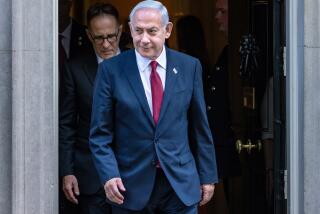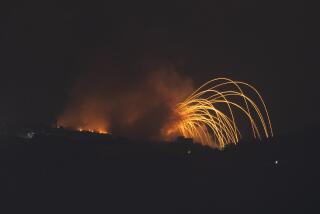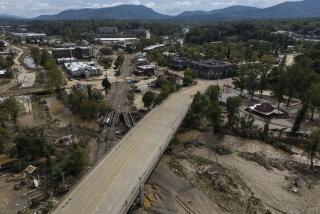Hope a Casualty of Sri Lanka Blast
For Gami Dharmapale, who missed being at the site of this capital’s huge truck bombing Wednesday by just 10 minutes, the explosion vaporized any remaining confidence he had in the government.
“Yes, there is a way to stop such things,” the tour guide said, nodding at the charred ruins in which 76 people are known to have died and more than 1,270 were injured. “But to do it, you’ve got to stop sitting on the fence. When the LTTE [Liberation Tigers of Tamil Eelam] threatened to hit Colombo, what did the government do? They waited to be hit.”
Still digging bodies out of the wreckage two days after the attack, Colombo remains so wary of another terrorist strike that when soldiers fired off field guns Friday morning to rehearse for Sunday’s National Day festivities, it provoked near-panic in some neighborhoods. Trading was interrupted briefly on the stock exchange.
Most people in Colombo reacted to the bombing with stoicism, and thousands offered to donate blood or let their vehicles be used to rush the wounded to hospitals. But with a few more attacks, the ultimate victims in political terms could well be President Chandrika Kumaratunga--her credibility and her blueprint for ethnic reconciliation among Sri Lanka’s Sinhalese majority and the Tamil minority.
“I feel sorry for her. She wanted a quick political fix, and it didn’t work. Then she wanted a quick military fix, and it didn’t work,” said Neelan Tiruchelvam, a moderate Tamil member of Parliament and supporter of the president’s.
In 1994, Kumaratunga became, in succession, prime minister and president of this Indian Ocean island on the pledge to seek a negotiated peace with the Tamil rebels, who have been fighting for an independent homeland in Sri Lanka’s north and east since 1983.
After the Tigers unilaterally broke off negotiations and a cease-fire last April, her government mounted the biggest offensive in the history of the war.
This week’s mammoth blast, which wrecked much of the country’s commercial and banking center, was widely perceived as a warning by Tiger leader Velupillai Prabhakaran that he cannot be circumvented in the political process that Kumaratunga has launched to try to end the civil war.
The government also accused the rebels of carrying out the bombing to stampede Sinhalese into taking revenge on ordinary Tamils and further polarize the two groups.
If that was the intent, it clearly didn’t work. The Tamil-language press ran articles after the explosion on how Tamils injured in the attack were helped by Sinhalese.
“It was like the Oklahoma City disaster--people responded as a community,” Tiruchelvam said.
But many Tamils in Colombo were uneasy, remembering the anti-Tamil riots that erupted here in 1983, claiming 400 lives by official tally and as many as 4,000 by unofficial count.
Already, Kumaratunga’s plan to allow the Tamils more legislative and executive powers in the areas where they predominate has aroused disquiet, and even overt hostility, among some Sinhalese Buddhists; they see the mostly Hindu Tamils, in historical terms, as invaders from India.
“The government is trying to push forward with this package although the Sinhalese people are not so happy,” charged Gallege Punyawardana, a spokesman for the Federation of Buddhist Organizations, an umbrella group. “At the same time, the government has been friendly toward the Tigers. The result is that the Tigers have been able to blast the Central Bank.”
Even the nation’s political elite is riven with fault lines that could prove dangerous for Kumaratunga, and these divisions may widen as a result of Wednesday’s blast. The main opposition United National Party has yet to pronounce its verdict on the president’s proposal to turn Sri Lanka into a union of regions, which is supposed to go before an all-party legislative panel this month.
But former Prime Minister Ranil Wickremesinghe of the United National Party was quick to criticize Kumaratunga’s government for inadequate security measures in the capital that, he claimed, led to the Tigers’ attack.
After the bombing, the government vowed to step up the war against the guerrillas while courting Tamil public opinion, with or without the Tigers. But more large-scale destruction and bloodshed may be in store for Colombo unless, by third-party intermediary or otherwise, the peace talks channels broken off 10 months ago are restored.
“They cannot continue to claim that the LTTE doesn’t exist or has been marginalized,” Tiruchelvam said of Sri Lanka’s government. “We can’t afford to continue having economic losses of this nature.”
More to Read
Sign up for Essential California
The most important California stories and recommendations in your inbox every morning.
You may occasionally receive promotional content from the Los Angeles Times.









